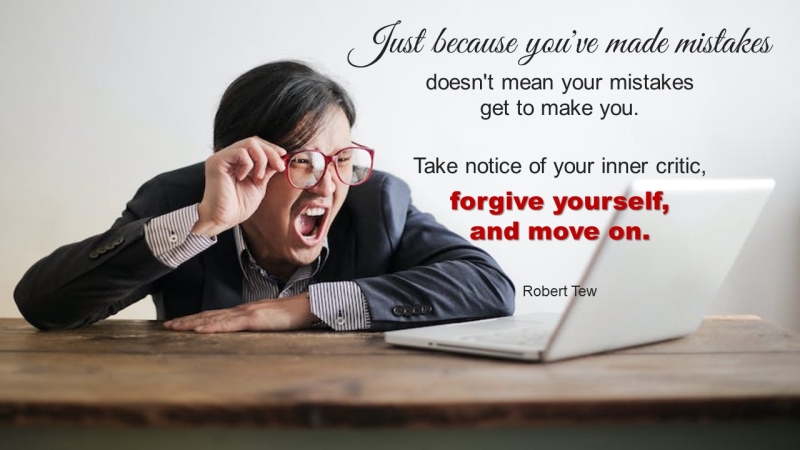HAVE YOU EVER FELT LIKE YOUR MISTAKES DEFINE YOU? Do you feel like you’ll never be able to overcome the guilt and regret of your past mistakes? It’s a shared experience but doesn’t have to be your reality. In this article, we’ll explore the power of self-forgiveness and a growth mindset in helping you rise above your mistakes and thrive in life.
The Problem with Dwelling on Mistakes
When we make a mistake, it’s easy to get caught up in an unproductive cycle of beating ourselves up for it. You might replay the incident repeatedly, wondering what you could have done differently, how you could have avoided it, or why you were so careless or stupid. The more you dwell on the mistake, the more it amplifies in your mind until it becomes a monster that looms over your every thought and action.
But here’s the thing: Dwelling on mistakes doesn’t help you learn from them or make them disappear. Instead, it reinforces the negative things you say to yourself, lowers your self-esteem, and makes you feel more stressed and anxious. It’s like trying to solve a puzzle by repeatedly staring at the same piece. It would be best if you stepped back, look at the bigger picture, and try a different approach.
How to Forgive Yourself and Move On
Self-forgiveness is not about making excuses for your mistakes, denying them, forgetting about them, or downplaying their effects. It’s about acknowledging your humanity, imperfections, and capacity to grow and learn from your experiences. Here are some suggestions to help you forgive yourself:
- Identify the root cause of the mistake. Sometimes, mistakes are just random accidents that happen despite our best efforts. Other times, they stem from more profound issues such as fear, insecurity, or lack of preparation. By understanding the underlying factors contributing to the mistake, you can address them and prevent them from recurring.
- Acknowledge your feelings. Feeling disappointed, frustrated, or angry at yourself is okay when you make a mistake. It’s a natural and healthy response. However, it’s important not to dwell on these feelings or let them define you. Instead, acknowledge them, accept them, and let them go.
- Reframe negative self-talk. Your inner critic can be your worst enemy or best ally, depending on how you interpret its message. Instead of beating yourself up with self-criticism and self-blame, reframe your self-talk more positively and constructively. For example, instead of saying, “I’m such an idiot for making that mistake,” say, “I messed up, but I’ll figure it out and do better next time.”
The Power of Growth Mindset
To have what’s known as a “growth mindset” means to adopt an attitude that values learning and development over innate talent or intelligence. When you adopt a growth mindset, you see mistakes as opportunities for learning rather than signs of failure or incompetence. Here are some ways to cultivate a growth mindset:
- Embrace challenges. Challenge yourself to learn new skills, take on new responsibilities, or tackle complex problems. Instead of avoiding challenges or giving up easily when things get tough, embrace them as opportunities for growth and development.
- Persist in the face of setbacks. Don’t give up or lose hope when you encounter obstacles or failures. Instead, see them as temporary setbacks that can be overcome with effort, persistence, and learning. Use the feedback from your mistakes to adjust your approach and improve your skills.
- Seek feedback and criticism. A growth mindset requires learning from others and accepting constructive criticism. Seek mentors, coaches, or colleagues who can give you honest and helpful feedback on your performance and use it to improve.
- Celebrate progress and effort. Instead of focusing solely on outcomes or results, celebrate your progress and measure it. Recognize the small steps you take towards your goals, and use them as motivation to keep going.
Examples of People Who Rose Above Their Mistakes
It’s easy to feel like you’re the only one who makes mistakes, but the truth is, we all do. Even the most successful and accomplished people have failed, stumbled, or made mistakes. Some well-known people who made mistakes but ultimately became successful are listed below.
- Walt Disney: Before he became a household name and an entertainment icon, Walt Disney faced numerous setbacks and failures. He was fired from a newspaper job for “lack of imagination,” his first animation studio went bankrupt, and he was told that Mickey Mouse would never work. However, he never gave up on his dream of creating a magical world of animation and storytelling. He eventually founded the Walt Disney Company, which is now worth billions of dollars and inspires millions of people worldwide.
- Michael Jordan: Michael Jordan, arguably the best basketball player of all time, didn’t always have a stellar reputation. He was cut from his high school basketball team as a sophomore, which motivated him to work harder and become more skilled. He went on to win six NBA championships, five MVP awards, and numerous other accolades, thanks to his relentless work ethic and determination to improve.
- J.K. Rowling: J.K. Rowling, the creator of the Harry Potter books, was once rejected and living in poverty. Twelve publishers rejected her first Harry Potter book before it was finally accepted, and she struggled with depression, anxiety, and financial hardship as a single mother. However, Rowling persisted in her writing and storytelling. Eventually, she became one of the best-selling authors of all time, inspiring millions of readers with her tales of magic, friendship, and courage.
- Thomas Edison: Thomas Edison is known as one of the greatest inventors in history, with more than 1,000 patents to his name. But he only achieved this success by making mistakes along the way. He famously said, “I have not failed. I’ve just found 10,000 ways that won’t work.” Edison faced setbacks, including a fire that destroyed his laboratory and years of experimentation that led to dead ends. But he persisted in his quest to create groundbreaking inventions, such as the light bulb, phonograph, and motion picture camera. He revolutionized the way we live and work.
- Oprah Winfrey: Oprah Winfrey is a media tycoon, philanthropist, and cultural icon, but she had a rocky road to the top. She suffered abuse, poverty, and childhood trauma and struggled with obesity and low self-esteem. Later in her career, she was fired from her first job as a TV news anchor, and her talk show was initially met with skepticism and low ratings. However, she refused to let her past or failures define her and instead used them as fuel to work harder and improve. She persevered in her career, built a media empire, and used her platform to promote self-improvement, social justice, and positive change.
These examples show that mistakes and setbacks are a natural part of the journey toward success. The key is to learn from them, persist in the face of adversity, and use them as opportunities to grow, improve, and achieve greatness.
Conclusion
Don’t let your mistakes control you. Instead, rise above them and thrive. By practicing self-forgiveness, cultivating a growth mindset, and learning from people who have overcome obstacles, you can turn your mistakes into chances to grow, develop, and succeed. Remember, you are not defined by your mistakes but by your resilience, perseverance, and willingness to learn and improve. So, take a deep breath, forgive yourself, and move forward confidently and purposefully. The best is yet to come.
CLICK THE IMAGE TO LEARN MORE




